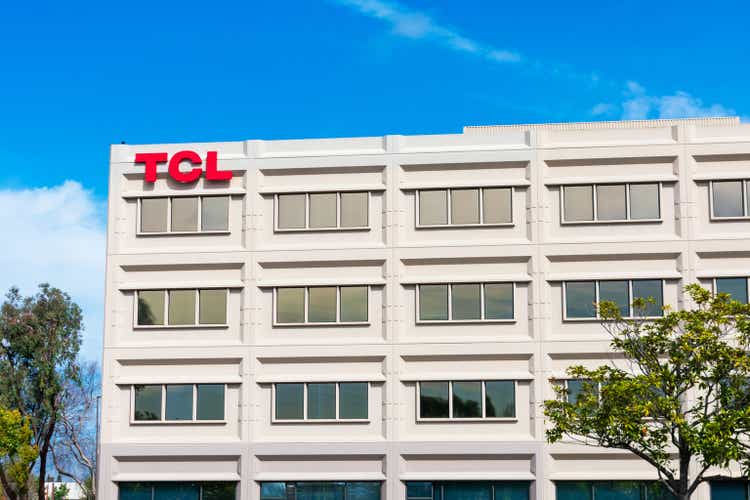Michael Vi/iStock Editorial via Getty Images
As one of China’s earliest technology standouts, TCL Electronics Holdings Ltd. (OTCPK:TCLHF) (1070.HK) has always been ambitious.
The company shot to global fame in 2003, when its parent, TCL Technology, struck a $560 million deal to take over the TV assets of France’s Thomson SA, making it the world’s largest TV maker. A year later it formed another joint venture by taking over the cellphone operations of France’s Alcatel. Neither of those tie-ups was particularly smooth, with the Thomson deal unraveling in three years, and the Alcatel deal in just one.
Both deals were driven partly by elements of politics as well as corporate pride, as China urged its companies to “go global” and TCL answered that call. Two decades later, could this former paragon of “going out” be preparing to do just the opposite and turn inward?
On Oct. 12, the Hong Kong-listed maker of TVs and other display devices announced a series of purchases of its publicly traded shares by its parent, its employee share ownership plan and its highly regarded new chairwoman Du Juan. Those purchases raised insider control of the company to at least 60%, and probably closer to 70%. The rapid shrinking of its public float raises the question of whether TCL Electronics might be inching towards privatization, as investors abandon its shares in favor of a newer generation of sexier high-tech companies.
If such a privatization is coming, investors certainly didn’t seem to sense it. The company’s stock price rose after the corporate share purchase announcement last Wednesday, though only by a very modest 1% to HK$3.
TCL has been sailing through choppy waters lately. It has been feeling the impact of disruptions from the global pandemic and China’s “zero-Covid” policy, U.S.-China trade tensions and global inflation. At the same time, TCL Technology is doing its best to follow Beijing’s latest directives calling on tech companies to innovate and stay at the leading edge of their fields.
TCL Technology’s other units have been taking steps to do just that through a series of major acquisitions and other moves over the last five years. Those include a new move into solar energy through a $1.9 billion polysilicon joint venture; the purchase of a China-based LCD plant from South Korea’s Samsung; and boosting its semiconductor business through the 2020 purchase of Zhonghuan Electronics’ core assets for about 11 billion yuan ($1.5 billion).
The moves come as China itself moves into a new stage that favors big state-owned enterprises as drivers of its tech development, taking over the mantle from a younger group of privately owned companies like Alibaba (BABA; 9988.HK) and Tencent (OTCPK:TCEHY)(0700.HK) that have more recently fallen out of favor.
While the broader corporate landscape changes, TCL’s publicly listed units have also gone through their own steady series of changes in their more than two decades of history. Founder Li Dongsheng took his first company public in 1999, about the same time it began exporting to its first international market, Vietnam. The parent TCL Corp. (000100.SZ) listed in Shenzhen in 2004.
Sudden stake increase
The parent company’s shareholding in Hong Kong-listed TCL Electronics held steady at 51% until the recent share repurchases, which leads to our assessment that the buybacks could presage a bid to take the Hong Kong-listed TCL Electronics private.
Such a privatization might make sense in this case, since TCL Electronics is currently getting little benefit from its publicly traded status and instead is being subject to recent market volatility. The stock is currently languishing around the HK$3 level, after briefly spiking to as high as HK$5.20 in mid-August after releasing first-half results.
TCL’s shares are down about 24% over the last year. While that looks weak, it’s actually doing better than the broader Hang Seng Index, which has fallen by nearly 40% over the same period. The company is grappling with rising costs as a percentage of revenue, and its debt to total capital ratio exploded from 2.65% in 2020 to 30.43% in 2021.
TCL Electronics currently counts smart screens as its biggest breadwinner, making up 65% of revenues. The company is clearly a winner in that category. It is quickly gaining ground in that segment with rivals South Korea’s Samsung and LG Electronics, which together control half of the global market.
In September, the head of TV Product Planning for LG told the Korea Times: “By companies, Chinese maker TCL is now very close to the Korean makers. Though LG has the second-largest share, I think we have to be humble because I can imagine how we looked 10 years ago when I see Chinese makers like TCL or Hisense.”
TCL’s recent rise as a highly regarded global player comes as it tries to fill a void created by Japanese veteran Panasonic, which decided to stop most of its own TV production last December. Around the same time, TCL signed a deal to produce budget models under the Panasonic brand name.
Du’s background as CFO of TCL Technology may come in handy if she is planning a restructuring for Hong Kong-listed TCL Electronics to take some excess fluff from the company. Outside its core smart screen business, the company still derives 35% of its revenue from other businesses like white goods and a TV streaming service. To trim the fat, Du might want to take the company private temporarily, perhaps before re-launching it on Shanghai’s young Nasdaq-style STAR market as a more focused tech play.
Or she might simply leave the Hong Kong-listed company as it is. As one of China’s oldest tech names, the company is profitable and probably not under any big financial pressure at the moment. Unlike its younger peers, it actually pays dividends, most recently giving out HK$0.167 per share for 2021.
Disclosure: None.


Be the first to comment